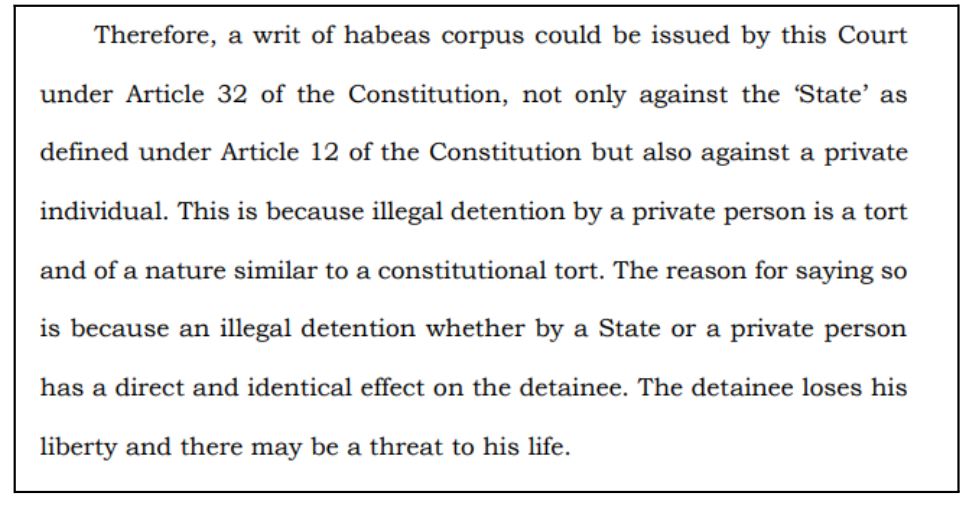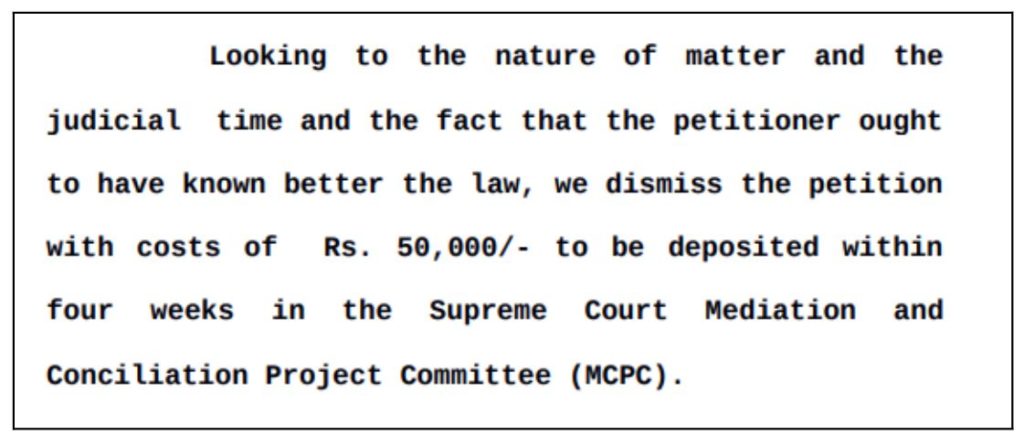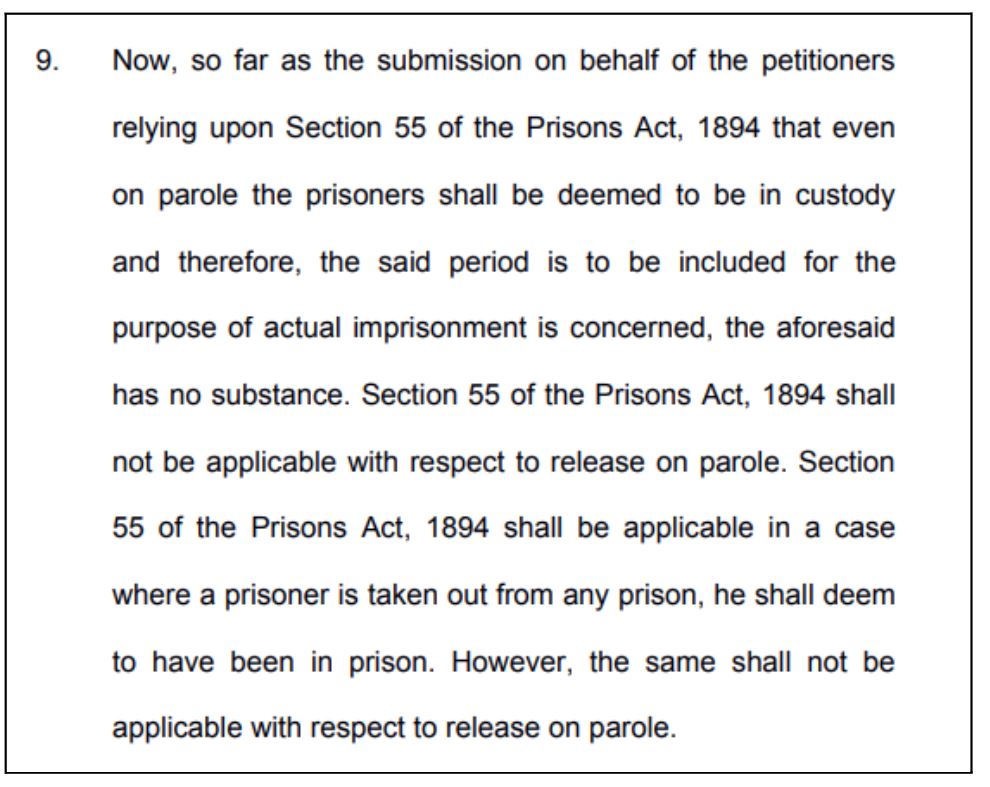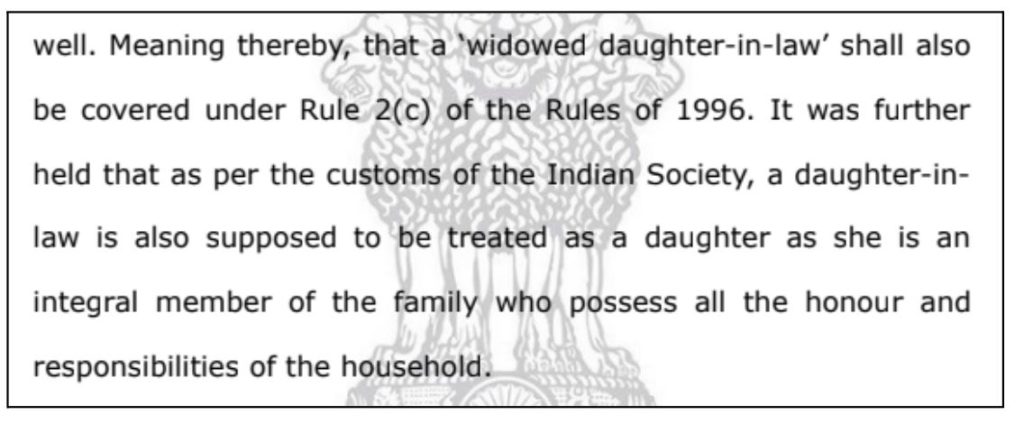In this week’s review of Court Judgments, we look at Supreme Court’s judgment regarding the liability of government for statements made by Minister, SC’s judgment about there being no provision prohibiting the appointment of a lawyer practicing in the Supreme Court as High Court Judge, SC’s judgment that parole period should be excluded from period of actual imprisonment in calculation for release from prison, Rajasthan High Court’s decision that widowed daughter in law is also eligible for compassionate appointment.
SC: If minister’s speech results in officers harming people or citizens, it will be a constitutional tort
In Kaushal Kishor vs. State of Uttar Pradesh, a petition was filed to register a complaint and seek action against the then Minister of Urban Development of UP for making statements outrageous to the modesty of victims. The minister had termed a theft and gang rape incident as a political conspiracy in a press conference. This case raised concerns about the state’s obligation to freedom of speech and expression.
A five-member Constitution Bench of the Supreme Court comprising Justices S. Abdul Nazeer, B.R. Gavai, A.S. Bopanna, V. Ramasubramanian and B.V. Nagarathna in a 4:1 majority, held that additional restrictions, not found in Article 19(2), cannot be imposed on the exercise of the right to free speech under Article 19(1)(a) on any individual. Further, it held that the grounds mentioned in Article 19(2) for restricting free speech are exhaustive.
The Bench added that statements made by Minister, even if traceable to any affairs of state or protecting the government, cannot be attributed vicariously to the government even applying the principle of collective responsibility. It noted that a fundamental right under Article 19/21 can be enforced even against persons other than the State or its instrumentalities. The state also has the duty to protect the rights of a person under Article 21 if there is a threat to personal liberty even by a non-State actor.
It stated that a mere statement made by a Minister, inconsistent with the rights of a citizen may not constitute a violation of constitutional rights. But if because of such a statement, any act of omission or commission is done by the officers resulting in harm or loss to a person/citizen, then the same may be actionable as a constitutional tort. A constitutional tort is when the state or its agencies violates the fundamental rights of the people.

In her dissenting judgement, Justice B V Nagarathna referred to international practice with respect to restraints of free speech. She stated that except for habeas corpus, the right to free speech cannot be enforced against persons other than the state.

SC: There is no provision prohibiting the appointment of a lawyer practicing in the Supreme Court as High Court Judge
In Ashok Pandey vs. Union of India And Ors, the petitioner is an advocate. He informed the Bench that four advocates who were practicing in the Supreme Court were a part of the list of recommendations from Allahabad High Court. In the past few years, he stated that six such persons were appointed by the High Court and called it a blatant violation of Article 217(2) of the Constitution. According to Article 217(2),
A person shall not be qualified for appointment as a Judge of a High Court unless he is a citizen of India and—
(a) has for at least ten years held a judicial office in the territory of India; or
(b) has for at least ten years been an advocate of a High Court or of two or more such Courts in succession.”
As per the petitioner’s interpretation, a person who may have been enrolled with a state bar council and subsequently shifted practice to the apex court is ineligible to be appointed as a judge of that court. He also contended that the lawyers practicing in the Supreme Court would be better than their counterparts in the High Court.
The SC Bench of Justices S.K. Kaul and A.S. Oka, noted that there was no provision in the Constitution that prohibited lawyers practicing in the Supreme Court to be appointed as Judge of the High Court. Moreover, every lawyer is enrolled with the Bar Council of a particular State. Dismissing the petition, the Bench asked the petitioner to pay Rs. 50,000 in the Supreme Court Mediation calling the petition ‘meritless’ and a ‘complete wastage of judicial time.’

SC: Parole period should be excluded from period of actual imprisonment
The petitioner in Rohan Dhungat vs. State of Goa and Ors had challenged the order passed by the Bombay High Court at Goa which held that period of Parole is to be excluded from the period of the sentence while considering the 14 years of actual imprisonment for the purpose of premature release. The original petitioners in the case were convicts undergoing life imprisonment and were released on parole under the Goa Prisons Rules, 2006. They had applied for premature release regarding which the State Government sought the Court’s opinion and rejected the release, considering the gravity of offence. The state government’s decision was challenged in the Bombay High Court, whose decision was then challenged in the Supreme Court.
The SC Bench of Justices MR Shah and CT Ravikumar explained that a specific reason is required for considering parole which can extend up to one month. It is granted by the State Government and may be granted more than once. They clarified that any prisoner who is influential may get parole for a number of times as there are no restrictions. In case, parole is included in the period of sentence, the purpose of actual imprisonment will be defeated. Citing this, the Bench dismissed the appeal.

Bombay HC: Compensation denied to victim of railway accident who was under alcohol influence when boarding the train
In February 2014, Deepak Nattuji Thakre succumbed to injuries following an accident when boarding a train. His wife and other family members claimed that the railways were liable to pay compensation along with interest as per the Railways Act, 1989. However, the railways argued that there was no valid ticket on the deceased’s body. Moreover, the pointsman and RPF constable stated that the deceased had tried to get into a moving train despite a warning. This was termed an act of negligence by the Tribunal. Furthermore, the Medico-Legal Case (MLC) report evidenced that the deceased was under the influence of liquor. Considering the lack of a valid ticket, negligence and the intoxicated state of the deceased, the railways tribunal dismissed the appeal.
The dependents then filed an appeal with the Bombay High Court which held that the facts and evidence pointed towards the deceased’s negligence. Justice Abhay Ahuja also added that the MLC report was from a government hospital and was good evidence to be relied upon. The explanation that the time gap between the incident, hospitalization and death was why the post-mortem report didn’t record the intoxication was also accepted. On these grounds, the High Court upheld the Tribunal’s decision to deny compensation under proviso (d) of Section 124 of Railways Act.
Rajasthan HC: Widowed daughter in law is eligible for compassionate appointment
The case Sushila Devi vs. State of Rajasthan deals with the compassionate appointment of a daughter-in-law. The petitioner’s mother-in-law was appointed to the post of a ‘Coolie’ in the Public Works Department of Rajasthan. She died while working in harness with the said department, following which an application for compassionate appointment was filed by the deceased’s son who was also the petitioner’s husband. The petitioner’s husband also died soon after.
The petitioner, now widowed with the responsibility of looking after herself and three minor children, applied for compassionate appointment as per the Rajasthan Compassionate Appointment of Dependents of Deceased Government Rules, 1996. However, the department declined the application citing that a ‘daughter-in-law’ did not fall within the ambit of the term ‘dependent’ under the 1996 Rules. The petitioner then challenged the legality of the rejection as the entire family relied on the mother-in-law for survival because of which they were also ‘dependents’ as per the provisions of the legislation. Referring to an old judgment, Justice Sameer Jain of the Rajasthan High Court allowed the plea for a compassionate appointment along with the due benefits. The Court stated that ‘widowed-daughter-in-law’ was to be read as a part and parcel of ‘widowed daughter’.

Featured Image: Review of Court Judgments,


